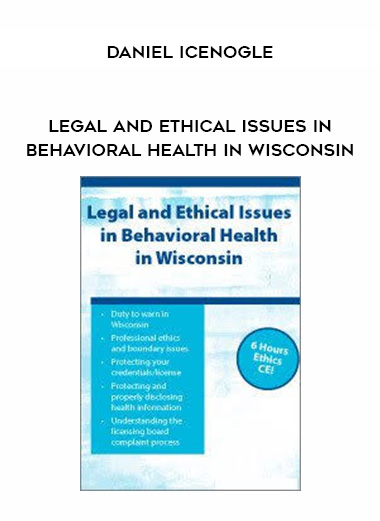LEGAL AND ETHICAL ISSUES IN BEHAVIORAL HEALTH IN WISCONSIN – DANIEL ICENOGLE
A better understanding of your ethical and legal obligations can not only help you provide more effective treatment to your clients, but can help you avoid costly mistakes. This seminar recording will provide you with the necessary tools to avoid a wide range of ethical and legal pitfalls.
Join attorney and emergency department physician Daniel L. Icenogle in this entertaining and enlightening recording and end with a greater understanding of the latest Wisconsin law as it relates to mental health. You will gain practical strategies to minimize and manage legal and ethical risks and you will learn how to immediately implement these risk reducing strategies into your practice.
- aluate your current record-keeping practices in order to ensure compliance with ethical and legal requirements in the state of Wisconsin.
- Determine which notes, documents, reports, forms, and clinical data constitute an official medical record in the state of Wisconsin.
- Compare the different requirements for release of protected health information via subpoenas and court orders.
- Differentiate between the processes for voluntary and involuntary commitment for treatment and determine the clinician’s role in each.
- Explore the legal and ethical considerations for the treatment of minor populations in Wisconsin with regard to age of consent, confidentiality and custody concerns.
- Communicate how an understanding of common boundary and dual relationship issues/dilemmas can help you maintain appropriate relationships with your clients.
GET LEGAL AND ETHICAL ISSUES IN BEHAVIORAL HEALTH IN WISCONSIN OF AUTHOR DANIEL ICENOGLE
Confidentiality of Mental Health Records
- Interaction of State Mental Health and Federal AODA Privacy Laws
- Patient Access
- Release With Authorization
- When and to Whom Records Can Be Released
- Psychotherapy Notes
- What Are They?
- Who Controls Them?
- Disclosure Without Authorization
- Permitted Disclosures for Treatment
- Permitted Disclosures for Other Reasons
- Mandatory Disclosures
- HIV Records
Subpoenas, Court Orders, Testimony, and Law Enforcement
- Subpoenas
- Different Types of Subpoenas
- What Do You Have to do?
- Limitations on Subpoenas
- Court Orders
- Court Orders for Records
- Court Ordered Examinations
- Search Warrants
- Providing Testimony
- Therapist Privilege
- Depositions
- Trial Testimony
- Law Enforcement
- Authority to Obtain Information
- Investigations
- Areas of Uncertainty
- Disclosure of Impending Discharge
- Disclosure of Treatment of Certain Injuries
Voluntary and Involuntary Mental Health Commitments
- Grounds for an Involuntary Commitment
- Threat to Others
- Threat to Self
- Procedures
Balancing the Rights of Minors
- Mental Health Records and the Rights of Minors
- Rights of Minors to Refuse/Consent to Treatment
- Access to Records
- Rights of Minors to Control Access to Their Records
- Alcohol, Drug Abuse and Treatment Issues for Minors
- Parental Rights
- Divorce Issues
- Custodial vs. Non-Custodial Parents
- Foster Parents
- Adoptive Parents
- Educational Health Records and FERPA
- Emancipation
- Minors and Medical Treatment
Professional Boundary Issues
- Boundary Issues: Therapeutic
- The Dual Relationship
- Special Issues for Rural Providers
- Social Media
- Boundary Issues: Civil Liability
- Boundary Issues: Regulatory Issues
- Process and Procedure
- Telehealth and Teletherapy






